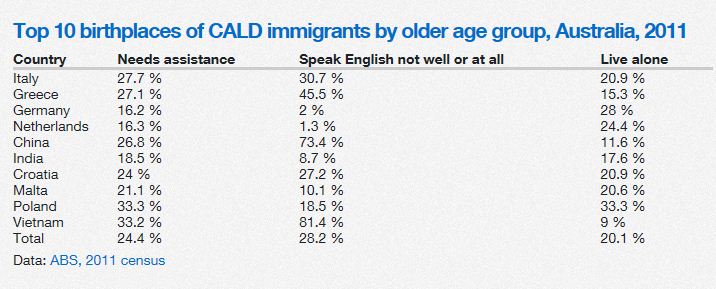CALD aged care an emerging issue – report
 Older migrants in Australia are more likely to have problems accessing basic services because of linguistic and cultural barriers, according to new research by the nation’s leading ethnic community group.
Older migrants in Australia are more likely to have problems accessing basic services because of linguistic and cultural barriers, according to new research by the nation’s leading ethnic community group.
The report, commissioned by the Federation of Ethnic Communities’ Councils (FECCA), found that Australia’s aged care sector is in need of more interpreters and bilingual staff to meet the needs of clients from non-English speaking backgrounds.
Titled ‘Review of Australian Research on Older People from Culturally and Linguistically Diverse backgrounds’and produced by the Australian Population and Migration Research Centre at the University of Adelaide, the report also said many aged care facilities failed to provide culturally appropriate care, including a lack of homeland food or traditional medicine.
It found older migrants from non-English speaking backgrounds, especially those with poorer English skills, tended to have poorer health outcomes than other Australians.
The report included data that showed there were 1.3 million Australians aged over 50 from non-English speaking backgrounds.
The study drew on data from the 2011 census, which said 20 per cent of Australians aged 65 years and older were born in non-English speaking countries.
And it forecasted the number of older Australians from non-English speaking backgrounds to grow significantly over coming decades.

A key finding was the need to recognise that older people from CALD backgrounds in Australia were not a homogenous group.
“They encounter different outcomes based on individual experiences and backgrounds. This diversity means that understanding and meeting the needs of Australia’s older people from CALD backgrounds is highly complex and needs to be informed by research and evidence,” the Federal Government-funded report said.
It said one of the major health challenges confronting many older Australians from non-English speaking backgrounds was dementia.
The report forecasts the number of dementia sufferers from culturally diverse backgrounds is set to grow from 35,000 in 2010 to 120,000 by 2050.
“Many dementia sufferers from non-English speaking backgrounds reverted back to their first languages and often needed extra support from bilingual health workers or interpreters,” the report said.
It highlights the changing cultural make-up of Australia’s older population; predicting older migrants from China, Vietnam and India are likely to outnumber those from Greece and Italy over coming decades.
FECCA chair Joe Caputo said aged care needed to be far more responsive to the nation’s cultural diversity.
“Different communities have got different traditions and different ways of going about and caring for older people,” Mr Caputo said.
“So I think the system has to be flexible enough and understanding of the diversity of the communities that are getting older in Australia.”
Mr Caputo said it was clear from the report that some older Australians from migrant communities preferred for family members to care for them, rather than receive care in aged care facilities.
He said this was particularly true for migrants from Greece and Italy, but also for those born in China.
“I think that most people would like to stay at home for as long as possible and they would like to have family members assisting them as they are getting older or getting frail and I think policy-makers can ensure that we put more resources into ensuring that people can stay at home, either looking after themselves or assisting family members who are looking after older people,” Mr Caputo said.
Chief Executive of Multicultural Aged Care Rose Colanero said the current aged care system was not keeping pace with the changing cultural make-up of the population and was failing to provide enough bilingual workers to support them.
“The Vietnamese, the Chinese and the Indians of the future – they are the emerging communities, particularly the Chinese and the Indians and we will need an aged care service or aged care services that are able to deliver culturally appropriate care to them,” Ms Colanero said.
Helen Matovu-Reed
AMES Staff Writer












